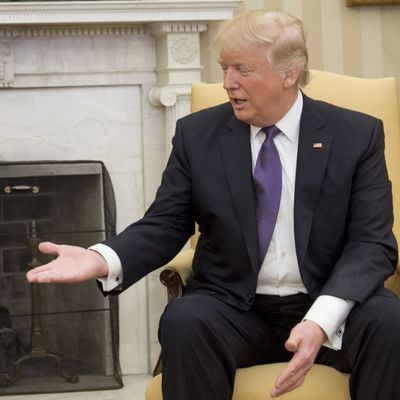
At the end of their annual summit, the leaders of the Group of 7 (G7) typically sign onto a joint statement, detailing the consensus views of the world’s advanced, industrial nations.
This year, that consensus end up being spelled out on a blank, unsigned piece of paper.
France and Germany have both threatened to withhold their signatures from a joint statement, unless the United States makes major concessions at the summit in Quebec this weekend. Absent “progress” on tariffs, the Iran nuclear agreement, and the Paris climate accord, Emmanuel Macron will not put his name beside Donald Trump’s, a French official told reporters Wednesday.
But that threat is unlikely to give Paris much leverage over Washington — because the White House was already planning to withhold its signature from the customary statement, as “a signal that the old ways of doing business are over.”
Such a signal is hardly necessary.
Less than three years ago, the U.S. signed an agreement in which Washington promised Britain, France, and Germany that it would suspend sanctions on companies and countries that did business with Iran, so long as Tehran suspended its nuclear weapons program. Tehran fully complied with this demand. British, French, and German firms proceeded to make investments in Iran — and then, last month, the United States withdrew from the deal anyway. Despite the fact that all the other signatories had upheld their ends of the bargain, the U.S. ordered European companies to immediately abandon their operations in Tehran (and thus, potentially, accept significant financial losses), or else, forfeit their access to America’s globe-spanning banking system.
Weeks later, Washington decided to flout a variety of other agreements it had signed with its Western allies, for the sake of inflicting pain on a few of their other industries. Last week, the White House slapped tariffs on its North American and European allies’ steel and aluminum exports — evading international rules against such duties by baselessly declaring America’s reliance on Canadian and British steel a “national security threat.”
And yet, President Trump remains convinced that the other G7 nations must make amends this weekend for their betrayals of the United States. According to the Washington Post, the White House is contemplating a new round of “economic penalties against Canada,” in retaliation for Ottawa’s threat to retaliate against America’s steel tariffs by placing duties on a variety of U.S. exports.
Trump’s conviction that America’s allies have benefited from one-sided trade agreements with the United States is not wholly unfounded. In the aftermath of World War Two – with Europe and Japan in ruins, and American industrial supremacy at its apex – Washington really did agree to give its overseas partners unfettered access to the American market without demanding reciprocal access for U.S. exporters. National security priorities were given precedence over economic ones: America was strong enough to take a hit for the sake of ensuring that Western Europe and Japan would recover from the last war — and be Washington’s allies in the coming cold one. As Dwight Eisenhower argued in 1955, “All problems of local [U.S.] industry pale into insignificance in relation to the world crisis. Japan cannot live, and Japan cannot remain in the free world, unless something is done to allow her to make a living.” Decades later, as Japanese and European industry approached parity with America’s, this uneven playing field would do immense damage to American manufacturing (while offering considerable benefits to American consumers).
Still, it is not as though the United States hasn’t reaped benefits from the hegemony it bought with its benevolence on trade. And, more to the point, there’s little sign that the actual facts of America’s trade relationships with Europe and Canada are all that relevant to the current conflict. Earlier this year, President Trump publicly admitted that he did not bother to look up whether America ran a trade deficit or surplus with Canada before speaking with Prime Minister Justin Trudeau about Ottawa’s supposed economic abuse of the U.S. (He also did not bother to look up which nation burned down the White House in the War of 1812 before telling Trudeau that Canada’s role in the act of arson justified his decision to treat America’s reliance on Canadian steel as a national security threat.) And, of course, nothing about the history of trade relations between America and Europe justifies the president’s callous indifference to the latter’s interests in Iran, or humanity’s interest in the preservation of the Paris climate accords.
The fundamental problem facing America’s G7 partners is that Trump’s policies are not rooted in a rational interpretation of commonly accessible facts. Rather, they are based on a combination of gut instinct and domestic political calculation. The president has no interest in preserving goodwill that might prove useful to the United States at some point in the future. He wants to perform his steely commitment to putting “America first,” and to assert his dominance over foreign heads of state who refuse to show him all due respect. As White House aides told the Washington Post, the president “prefers visiting places where he is feted — such as on his trips last year to Beijing, Paris and the Saudi capital — over attending summits where the attending leaders are treated as equals.”
There is some evidence that Trump is open to negotiating in good faith if the other side is willing to flatter him or do favors for his businesses. But those options aren’t available to most democratic leaders, who are accountable to publics that almost universally despise the American president.
Thus, for all of the pressing issues currently dividing the United States from its G7 partners, it’s unclear whether they’ll have anything to talk about in Quebec. Like a reality-show villain, Trump’s America isn’t here to make friends (or self-interested diplomacy), but rather, to engage in pre-orchestrated feuds. And for the moment, our allies have no way to vote us out of the Western alliance.






























